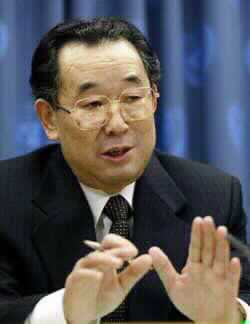North Korea became on Saturday the first country to withdraw from a pivotal global treaty preventing the spread of atomic weapons, triggering alarm around the world and frantic diplomatic activity to restore calm. However, the United States appeared to play down the nuclear standoff, acknowledging that the latest move by the reclusive communist state was cause for concern but was not unexpected.
The U.N. International Atomic Energy Agency watchdog sought to reassure worried governments that it did not see North Korea's decision to withdraw from the nuclear Non-Proliferation Treaty as raising the stakes in the crisis and felt there was still room for diplomacy to work.
Making the announcement of its immediate withdrawal, Pyongyang blamed what it called Washington's "hostile" policy but said it had no intention of developing nuclear weapons.
South Korean commentators focused on a line in Friday's furious statement from Pyongyang that appeared to leave the door ajar to a diplomatic solution by inviting the United States to verify that the North did not possess nuclear weapons.
Diplomatic sources with close ties to Pyongyang told Reuters in Tokyo that North Korea would agree to scrap its weapons plans if Washington reaffirmed a 2000 joint communiqué that declared the two nations had "no hostile intention" toward each other.
DIPLOMATIC FLURRIES
Diplomatic moves were under way in the United States, where New Mexico Governor Bill Richardson said he would have a final round of talks with North Korean officials on Saturday morning as the United States sought a diplomatic solution to persuade North Korea to abandon its nuclear weapons program.
Richardson, a Clinton administration official with experience of dealing with Pyongyang, met two North Korean U.N. officials throughout the day on Thursday.
U.S. Assistant Secretary of State James Kelly is due in Seoul on Sunday and Japan's foreign minister visits three days later.
South Korea, its capital within easy range of an estimated 11,000 North Korean artillery barrels lined up along the border, stressed the need for Pyongyang to come to the negotiating table.
The two Koreas fought a bloody war in 1950-53, and North Korea came close to conflict with the United States in 1994 when it first threatened to pull out of the Non-Proliferation Treaty amid suspicions about its nuclear program.
The secretive Stalinist state has had the world on tenterhooks since expelling U.N. nuclear inspectors last week. Tensions have been rising on the divided Korean peninsula since Pyongyang admitted to Kelly in October that it had been pursuing a nuclear arms program in violation of a 1994 agreement.
Those tensions were heightened this month when North Korea disabled U.N. nuclear monitoring equipment and threatened to reactivate a nuclear plant capable of producing weapons-grade plutonium.
"North Korea has thumbed its nose at the international community," said Secretary of State Colin Powell, while insisting that Washington would maintain a diplomatic approach. "We're not going to be intimidated, we're not going to be put into a panic situation."
TALKS AND MORE TALKS
US Secretary of State Colin Powell and Mohamed ElBaradei, the IAEA director-general, signaled that they were in no hurry for the U.N. Security Council to take up the matter.
The IAEA is considering an emergency board meeting next week at the nuclear watchdog agency's Vienna headquarters, but the date had not been fixed, diplomats said at the United Nations.
At a rare news conference at the United Nations, North Korea's U.N. ambassador, Pak Gil Yon, said on Friday the U.S. offer this week to hold talks on his country's nuclear program without being willing to engage in full negotiations showed a lack of sincerity.
Pak also rejected negotiating with the IAEA, which he dismissed as "a tool" of the U.S. government. He made plain that Pyongyang would view it as a declaration of war if the U.N. Security Council were to impose economic sanctions against it.
PHOTO CAPTION
North Korean Ambassador to the United Nations Pak Gil Yon speaks at a news conference at United Nations headquarters, January 10, 2003. (Mike Segar/Re
- Author:
& News Agencies - Section:
WORLD HEADLINES


 Home
Home Discover Islam
Discover Islam Quran Recitations
Quran Recitations Lectures
Lectures
 Fatwa
Fatwa Articles
Articles Fiqh
Fiqh E-Books
E-Books Boys & Girls
Boys & Girls  Hajj Rulings
Hajj Rulings Hajj Fatwas
Hajj Fatwas














